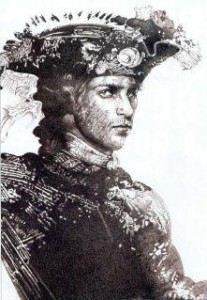Juan Bautista Basset y Ramos facts for kids
Quick facts for kids
Juan Bautista Basset y Ramos
|
|
|---|---|
 |
|
| Born | c. 1654 Alboraya, Valencia, Spain |
| Died | January 15, 1728 (aged 73–74) Segovia, Spain |
| Allegiance | Spain |
| Service/ |
Kingdom of Valencia |
| Years of service | 1718 - 1728 |
| Rank | Lieutenant-Colonel |
| Battles/wars | War of the Spanish Succession
|
Juan Bautista Basset y Ramos (born around 1654 in Alboraya, Spain – died January 15, 1728, in Segovia, Spain) was a Spanish soldier. He became famous for leading a big revolt in the Kingdom of Valencia. This happened during the War of the Spanish Succession, a huge conflict over who would be the next king of Spain. Basset led a group called the Maulets. These were people from Valencia who supported Archduke Charles of Austria to become king, instead of Philip of Anjou.
Contents
Who Was Juan Bautista Basset?
Early Life and Military Career
Juan Basset was born into a family of skilled workers. His father, Juan Basset, was a carpenter. He also worked as a sculptor and decorated altarpieces. His mother's name was Esperanza Ramos.
Juan Bautista Basset became a professional soldier. He joined the Austrian army of Archduke Charles of Austria. Charles later became the emperor of the Holy Roman Empire. In 1704, Basset sailed with a fleet of ships from England and the Netherlands. They were taking Archduke Charles to Spain. Charles wanted to become the new king of Spain.
Leading the Revolt in Valencia
In 1705, Allied troops captured Gibraltar. Then, on August 17, they landed in Denia. Just a few weeks later, Basset y Ramos arrived in the city of Valencia. He was a general for the forces supporting Archduke Charles. In Valencia, they announced that Archduke Charles was King Charles III.
In February 1706, Basset helped organize the defense of Játiva. His troops successfully fought off the forces of the Bourbon family. Basset led the people of Valencia in a revolt. They were against the government of Felipe V. King Philip V wanted to have all the power. Basset supported the farmers who wanted lower taxes. He also supported city merchants and artisans. They wanted to trade more with countries like the Netherlands and England. This made him the leader of the maulets. They were against the supporters of Philip of Anjou.
Challenges and Later Life
Even though Basset served King Charles, he was put in prison by him. This happened because Basset had promised Valencian farmers that they would not have to pay certain fees and taxes.
After the Battle of Almansa on April 25, 1707, Basset was released. His task was to gather the few remaining soldiers who supported Archduke Charles. This was a very difficult job. He also helped gather troops to defend Barcelona. His efforts helped delay the fall of the city until September 11, 1714.
Ten days after Barcelona surrendered, Basset was arrested. This happened even though promises were made not to punish people. Bourbon troops took him to Alicante. From there, he was moved to different prisons. He was held in places like Fuenterrabía and Segovia.
Juan Bautista Basset y Ramos died in Segovia on January 15, 1728. The Jesuits helped bury him. Just before he died, Emperor Charles VI sent him a message. It said that Basset had been promoted to a high military rank. He was now a Fieldmarshall-Lieutenant in the imperial army.
See also
 In Spanish: Juan Bautista Basset y Ramos para niños
In Spanish: Juan Bautista Basset y Ramos para niños
- List of viceroys of Valencia
 | Leon Lynch |
 | Milton P. Webster |
 | Ferdinand Smith |

